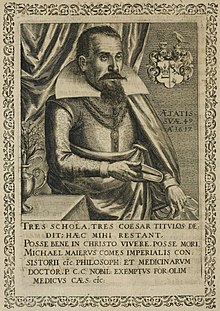Michael Maier
|
Michael Maier Imperial Count Palatine, Eq. Ex. Phil. & Med. D. |
|
|---|---|

Copper engraving of Michael Maier, from Symbola avreae mensae dvodecim nationvm. (Matthäus Merian, 1617)
|
|
| Born | 1568 Rendsburg, Holstein |
| Died | 1622 Magdeburg |
| Other names | Michael Maierus |
| Nationality | German |
| Fields | Medicine, alchemy |
| Alma mater | University of Basel |
| Known for | Atalanta Fugiens |
Michael Maier (Latin: Michael Maierus; 1568–1622) was a German physician and counsellor to Rudolf II Habsburg. He was a learned alchemist, epigramist and amateur composer.
Maier was born in Rendsburg, Holstein, the son of a specialist in beadwork in embroidery named Peter Maier. He studied philosophy and medicine at (1587–1591), Frankfurt (Oder) (M.A. 1592), and Padua (1595–1596). Maier left Padua abruptly after getting involved in a fight, injuring the other party, and being arrested. He went on to the University of Basel, where he attained a doctorate in medicine in October 1596. His doctoral thesis, De epilepsia was dedicated to Matthias Carnarius.
Maier then returned to Holstein to practice medicine. Around 1599, he became interested in alchemy and attempted to create an alchemical concordance, synthesizing the works of different authors. In 1608, he went to Prague, and on 19 September 1609, he formally entered the service of Rudolf II as his physician and imperial counsellor. Ten days later, Rudolf raised him to the hereditary nobility and gave him the title of imperial count palatine. He was granted a coat of arms which depicted a bird, bonded together with frog by a golden chain. Around this time, Maier published an extremely limited print run of De Medicina Regia et vere Heroica, Coelidonia (1609), including in it his autobiography. The interest of the emperor in the occult was the reason of his high esteem for Maier. Nonetheless, in April 1611, Maier left Rudolf's court and went in search of a new patron. He corresponded with Moritz of Hessen-Kassel, and visited Hessen-Kassel's brother-in-law, Count Ernst III of Holstein-Schauenburg. He was also a guest of Christoph Reinhard, Doctor of Laws and town syndic of Mühlhausen, to whom he later dedicated his book Atalanta Fugiens.
...
Wikipedia
